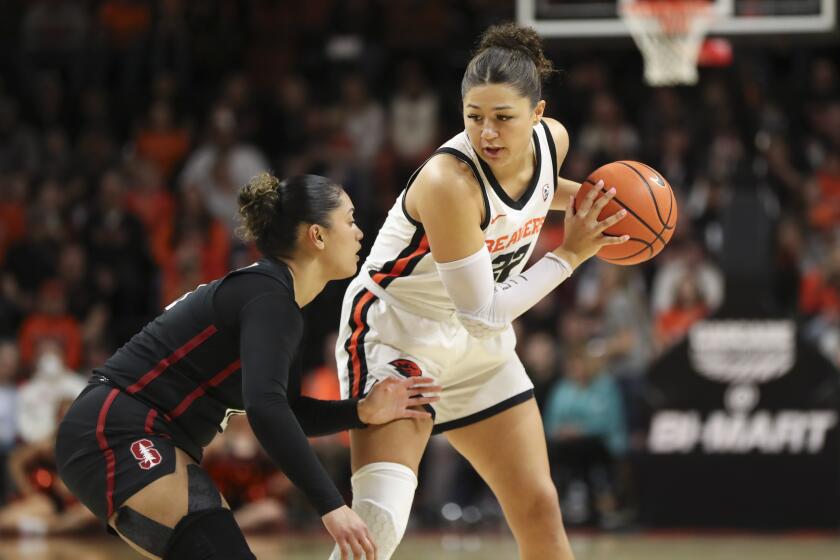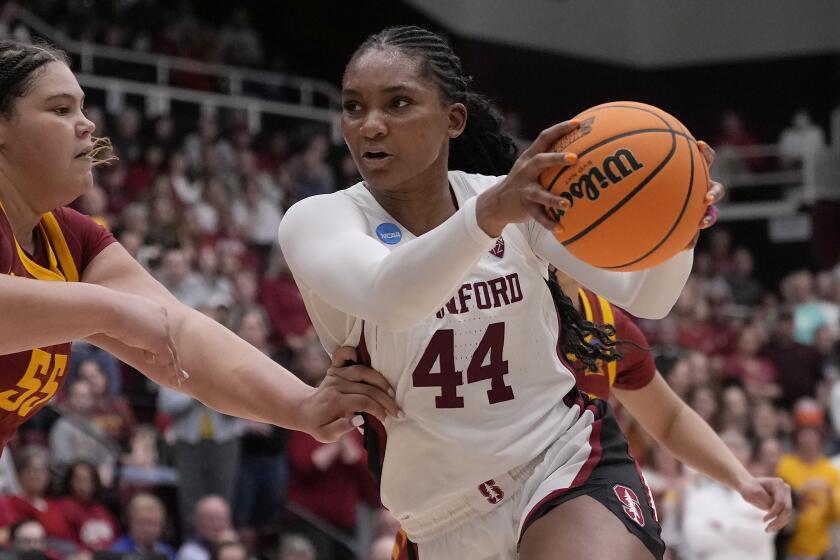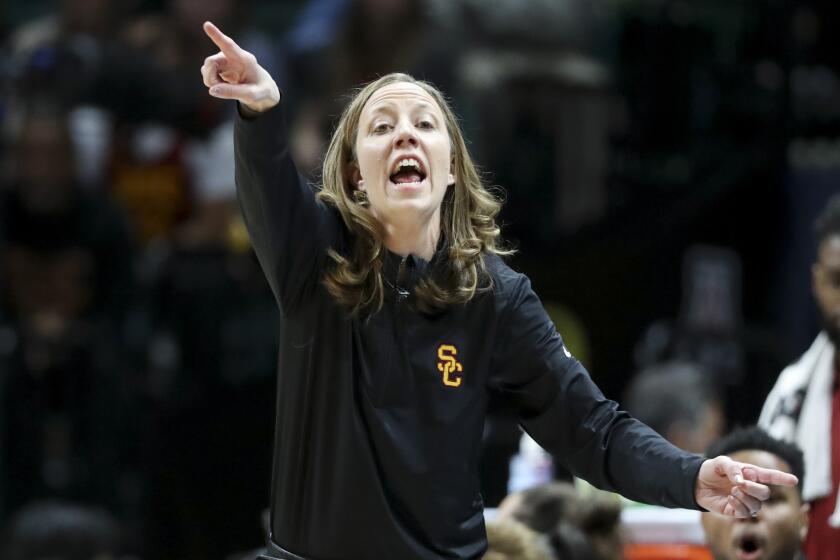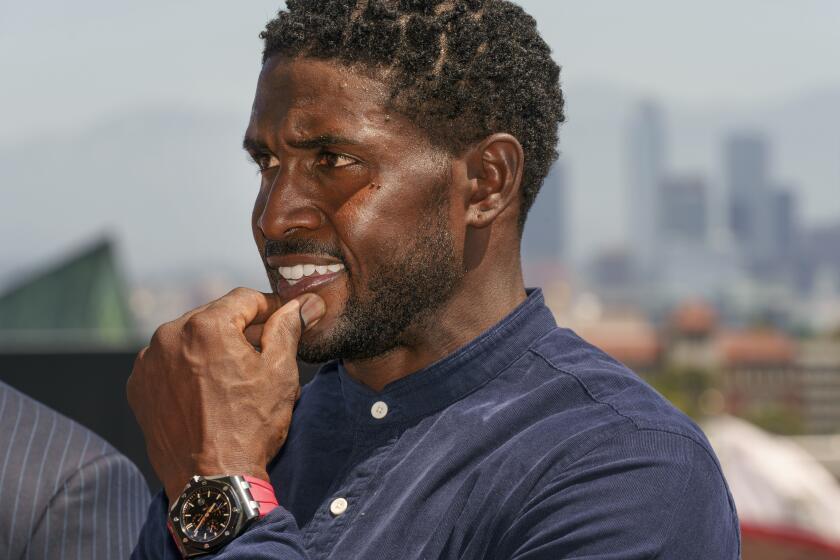Hedges Doesn’t Lose Her Focus at Washington
A decade has passed since Barbara Hedges left USC to become athletic director at Washington. In that span, as one of a few women to hold such a position, she has guided a multimillion-dollar fund-raising campaign, built new facilities and presided over winning seasons in everything from men’s basketball to women’s crew.
But her most-noted success over the last 10 years boils down to just 10 days.
That’s how long it took to fire Jim Lambright, a respected coach with a winning record, and hire Rick Neuheisel in his place. The once-controversial move is now seen as key to the football team’s return to national prominence.
With the Trojans playing at Husky Stadium this weekend, Washington is the reigning Rose Bowl champion, unbeaten and ranked 11th in the nation. Hedges understands that without success on the football field, no accumulation of fancy buildings and titles in less-visible sports will entirely satisfy alumni.
This dynamic is not lost on USC, where successes in such sports as baseball and women’s track and field have been overshadowed by struggles in football.
“Certainly, football is the focus,” Hedges said. “It’s the sport that over 70,000 people come to see on Saturday.”
Thus her willingness to pay Neuheisel almost $1 million a season in 1999, a contract that raised eyebrows around the coaching ranks. But only two seasons later, million-dollar deals are common--USC’s Pete Carroll got one in December--and Neuheisel looks like a bargain. So much so that Hedges recently boosted his package, including incentives, to $1.4 million.
“Barbara is very shrewd,” said Jim Perry, a USC assistant athletic director who worked with her when she oversaw Trojan women’s sports in the 1970s. “She’s not afraid to make decisions.”
In the world of college athletics, her work ethic is well-known. People say she can be charming but, always, competitive. “She’ll figure out a way to beat you in every way she can think of,” said Deborah Yow at Maryland, the only other female athletic director at a major Division I school.
Hedges learned the trade at USC, joining the athletic staff in 1973 after coaching gymnastics at Arizona. She was assigned the task of creating women’s teams at a university that, back then, offered only men’s sports. The job involved long days and a steep learning curve.
“I raised money, hired coaches, ran programs,” she recalled. “I did everything.”
She did it well enough to be among two finalists for the athletic director’s post in 1983. Though USC chose Mike McGee, Hedges remained on campus. “Things have a way of working out for the best,” she said.
For the next six years she gained experience, taking charge of a number of men’s programs, until the Washington spot opened in 1991. At the time, San Diego State was the only other Division I school with a women athletic director.
The Washington job was overwhelming at first, more work than Hedges could have imagined. The Huskies won a national championship in football that year--the new athletic director thought she had it made--but rocky times were ahead. The NCAA sanctioned the program in 1993 and then-Coach Don James resigned. The team suffered through a two-year bowl ban.
Lambright got credit for rebuilding the Huskies, amassing a 44-25-1 record and taking them to four bowl games in six years. But when they faltered in 1998, Hedges first pledged her support then grew dissatisfied. The decision to fire Lambright, she says, was “very, very difficult” and was certain to bring criticism from fans and the media. The only way to quiet the doubters, she knew, was to hire someone who could make them forget about Lambright.
After several days of calling around the country and combing through possibilities, she fixed on Neuheisel. It was a debatable choice. The young coach was still an unknown quantity, leading Colorado to 10-2 records in his first two seasons, struggling thereafter. People questioned his player-friendly approach. There was no guarantee he wanted the job.
Hedges had nonetheless made up her mind and offered to better his Colorado salary of $650,000 by half. In less than two weeks, the deal was done. The former UCLA quarterback became the state’s highest-paid employee and, when Washington lost its first two games of the 1999 season, the criticism grew louder.
“Part of the job,” Hedges said. “There are times you wish it weren’t so visible.”
Only two years later, the hire looks picture-perfect. Another feather in the cap for one of the original women in a male-dominated arena that now includes six female athletic directors at Division I schools and more at lower levels. “She paved the way,” says Mike Cleary, executive director of the National Assn. of Collegiate Directors of Athletics.
Not that all has gone smoothly. Hedges and university President Richard McCormick have come under investigation for using Rose Bowl funds to fly friends, school employees and supporters to the game last January. Hedges insists this is a standard practice among athletic departments and “the same way the University of Washington has been traveling to bowl games for 20 years.”
In the meantime, she has raised $54 million to refurbish the basketball arena and build an indoor practice field. She was praised by the Chronicle of Higher Education for achieving substantial equality among men’s and women’s teams at Washington. Street & Smith’s SportsBusiness Journal rates her as one of the most influential women in sports.
“I couldn’t be happier,” she said. “We’ve had a chance to do some wonderful things at Washington.”
Things that make alumni proud, as long as the football team keeps winning.
Go beyond the scoreboard
Get the latest on L.A.'s teams in the daily Sports Report newsletter.
You may occasionally receive promotional content from the Los Angeles Times.




